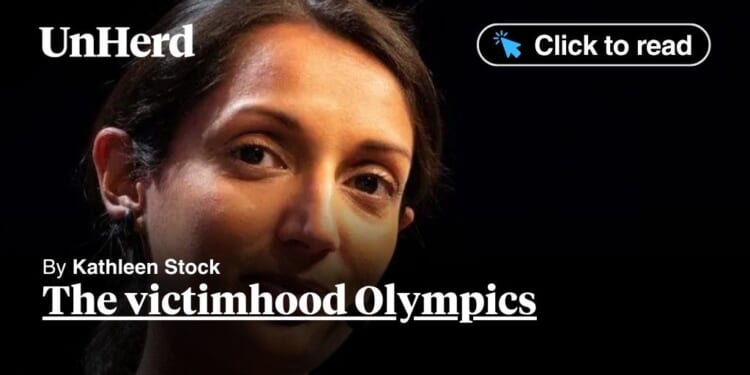When Mary Beard tweeted out a picture of herself weeping in 2018, her critics were pitiless. Even four years later, the travel writer Monisha Rajesh was still caustically tweeting about the moment when “Mary Beard did her white tears”. According to a widely disseminated narrative, the Cambridge classics prof had already disgraced herself with an earlier, implicitly racist tweet, and was now “weaponising” her anguish at the resulting criticism, in a manner inaccessible to black and brown women. Beard’s crying was framed as a deliberate action — as deliberate and as culpable as her subsequent act of posting the photo of it for the public to see.
Though white tears remain technically unavailable to Rajesh in virtue of her skin colour, this week it became clear that she too is capable of crying in public. On an Instagram reel, she presented her own moist-eyed tribute act to Beard, and it went down about as well as the original. Sobbing volubly in a post which has since been made private, Rajesh bemoaned the news of a forthcoming BBC podcast in which she is to feature, and blamed bosses for exposing her to online abuse as a result. Entitled Anatomy of a Cancellation, this six-part series for Radio 4 will apparently explore the stark claims of racism made by Rajesh and several others towards poet and teacher Kate Clanchy in 2021, as well as the supine apologies of Clanchy’s then-publisher in light of the subsequent media frenzy.
Both Rajesh’s tears and the relatively neutral tone of the BBC press release are a far cry from the heady days of 2021. Back then, the travel writer was apparently comfortable enough with the Beeb to tell its reporter that Clanchy’s book — a high-minded tale about teaching immigrant school kids, which had won an Orwell Prize in 2020 — was “riddled with racist and ableist tropes” and “rooted in eugenics and phrenology”. She later wittily coined the nickname “KKKlanchy” for her target on Twitter.
Meanwhile, the BBC had yet to grasp that there might be a newsworthy witch hunt going on in the publishing industry. Instead it solemnly reported that Clanchy had the temerity to describe two autistic children she personally knew as “jarring company” and “unselfconsciously odd” in her very own literary creation. Alongside the account of this supposedly heinous crime, there was a helpful link to a resource entitled “The harmful ableist language you unknowingly use”, explaining to any readers puzzled by the fuss that everyday expressions like “dumb”, “to turn a blind eye”, and “psychopathic” constituted “micro-assaults” against disabled people.
But we are in 2025 now, thank God, and we don’t have to turn a blind eye to all that dumb stuff anymore. Entirely appropriately, this week Clanchy received an apology from the new CEO of her ex-publisher Pan Macmillan for a “regrettable series of events” that was said to have caused “hurt” to her at the time. The Times also published a sympathetic piece, documenting astonishingly callous treatment of the poet by those within the publishing industry, and describing how, at one point, she had contemplated suicide because of it. From a distance, it looks like Clanchy is now living the dream of every person ever cancelled in public: not just bathing in the warm tears of her enemies, but also getting recognition for having suffered serious injustice from suitably authoritative-sounding institutions. After all — in the absence of information about the precise contents of the Last Judgement — the verdicts of mainstream media outlets still offer a passable shot at redemption.
As I read the Times piece, I thought of a recent, highly pertinent Economist column, which argued that the symbolic figure of the victim has become the “apex stakeholder” in modern society. The subject of this article was not victims in the straightforward sense of a person who has undergone a serious harm of some sort. Instead, it was about a much more exclusive set: people who have been publicly recognised as suffering serious harm. This is another matter entirely, as those affected by the grooming gang scandal demonstrates: ignored for years, now suddenly championed by nervous politicians. Such is the cultural capital of the victim in this socially approved sense, the Economist argued, the only way to stymie the political momentum of one of them is to find another victim whose interests are said to markedly differ. Or, as the piece says, it takes a victim to stop a victim.
Certainly, this looks true of the Clanchy saga, although I’m sure the woman at its epicentre wishes it was otherwise. Against the original claims about the terrible suffering of ethnic minorities and disabled people, said to be caused by Clanchy’s book and defensive reactions to its criticism, a competing set of claims was issued. These also mentioned online abuse, damage to mental health, and troubling suicidal ideation, but this time the proposed victim was Clanchy herself, along with any other creative artists cowed into fearful submission by marauding berserkers online. I’m not saying that it isn’t an awful experience to be the target of people like this — I know for a fact that it is — but still, it is striking that the only way to fight such obviously spurious charges is to emphasise how much their target has herself psychologically suffered in turn.
“Rajesh has forgotten the first rule of victim club”
And now we have Rajesh’s attempt to get in on the act again, presenting herself as a rival object of pity with her tear-stained monologue. Unfortunately, though, like Beard before her, Rajesh has forgotten the first rule of victim club, which is that you cannot be seen to advertise your own suffering too obviously — for this would exhibit an unseemly agency, and sit awkwardly with the passivity built into the brand. The ancient meaning of “victim” was “sacrificial offering to the gods”, after all; and essentially, that’s the mood board. To count as a victim in the socially approved sense, you can only look big-eyed, dignified and long-suffering, like a dumb animal waiting for the knife, leaving it to others to invade the abattoir in protest on your behalf. As soon as you intervene to obtain recognition for your own plight, you risk slipping out of the category altogether; now seen as vaguely complicit in whatever first happened to you, or even as an active oppressor of the other, should your tone sound too excitable or harsh.
Yet for many, there remains a manic compulsion to plead your case to the wider world — even when you know that doing so is pointless, and even when nobody is accusing you of anything at all. At a deep level, it is probably due to what the German philosopher Odo Marquard has called the “tribunalisation of experience”: that nagging sense of personal guilt engendered by the modern godless predicament. Assuming that one can no longer pin ultimate causality on a higher being, a worrying question mark hovers perpetually over one’s own forays into deliberate action, along with an unconscious desire to be absolved in advance. There’s a corresponding urge to be formally designated by other people as spotless victim and not as red-handed oppressor. Or as Marquard wrote, anticipating the massive trend for defensiveness on the internet: “For today, everything seems to need justification: … the way one’s hair grows, one’s mood, one’s life, education, bathing suits; only one thing—one wonders why—needs no justification, and that is the need to justify to one and all.”
In this light, the tearstained visual documents offered by Beard and Rajesh transcend racial divisions, and speak to a touchingly common human predicament: the wish, deep down, to appear more sinned against than sinning. Public apologies are easy; the hardest thing of all is admitting to your secret self you might have messed things up. It almost makes you feel sorry for people weeping all over the internet. Ultimately, the desire for perceived victimhood is a poisoned chalice. Far better to hark back to a more stoic age, and do your crying in the rain with the camera off.

















